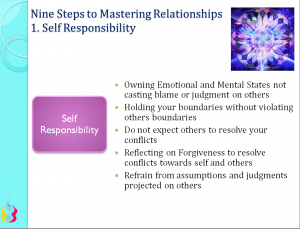Self-Responsibility: Difference between revisions
No edit summary |
No edit summary |
||
| Line 7: | Line 7: | ||
Improving our [[Compassion]]ate communication with others, improving our relating skills, personally and in group dynamics, is a skill set that will go a long way to serve your mission. With that in mind we set forth a few guidelines to remember when communicating with others or relating with others. The first step is [[Self-Responsibility]] in all of your thoughts, actions and behaviors with yourself and others. | Improving our [[Compassion]]ate communication with others, improving our relating skills, personally and in group dynamics, is a skill set that will go a long way to serve your mission. With that in mind we set forth a few guidelines to remember when communicating with others or relating with others. The first step is [[Self-Responsibility]] in all of your thoughts, actions and behaviors with yourself and others. | ||
==Responsibility and Accountability== | |||
Many people confuse responsibility and accountability as being one in same. In the practical reality, they are character traits that are more like two sides of the same coin. Being accountable has more to do with giving up certain [[Ego Defense Mechanism]] behaviors, such as negative beliefs and attitudes, than just making an effort to behave or relate to others in a different way. One of the most common ego defense mechanisms used to avoid personal accountability or responsibility is to become upset, blaming others or to have a tantrum. When a person goes into tantrum mode or gets upset, obviously, they can no longer effectively handle the matter. They have gone “unconscious”. When a person goes unconscious and engages in tantrums, they are now fodder for dark and negative energies in the vicinity. This is a common ego defense to avoid facing the truth of the matter or the task at hand and to avoid any attention being placed upon the person’s accountability to their actions. It’s a diversion tactic made by the unconscious or [[Three Layers of Ego|conscious personality]]. This is done by simply tuning someone out, or by having a mental conversation while someone is attempting to point out how you could have assumed greater responsibility or accountability.<ref>[http://www.energeticsynthesis.com/index.php/resource-tools/ascension-tools/assessing-trustworthiness/2435-accountability-2 Accountability]] | |||
==Compassionate Communication== | ==Compassionate Communication== | ||
Revision as of 00:18, 22 August 2014
Self-Responsibility – Being able to own your own emotional conflicts without blame, guilt or projection upon another person, by making it their fault. Do not assume that you know anything about that person that can be judged for what you cannot see or really know, as you have not walked in their “shoes”. When feeling upset, restore balance to your heart and aura, by lovingly holding your boundaries without violating others boundaries by expecting them to resolve your conflict. Be willing and open to learn what the “real issue” is, which most of the time not what it appears to be. Going deeper and reflecting on forgiveness of yourself and others, allowing time, neutralizes the conflict.
Relationship Mastery Guideline
Relationship Mastery Guidelines is has nine basic steps and is a Service to Others method based in the Law of One and cultivating GSF Behavior, while reaping the mutual energetic benefits of experiencing more spiritual connection, and increased love and appreciation returning back from others to you. Without attachment or expectation this happens naturally when you follow some basic guidelines. In certain areas where we have asked for “spiritual growth” beyond anything else, we may have periods where we are undergoing deep testing to our personal truth and personal beliefs. Eventually we all are able to be in this world, yet not of it, and have fulfilling, loving and appreciative bonds shared with others, whether in groups or personal relationships.
Improving our Compassionate communication with others, improving our relating skills, personally and in group dynamics, is a skill set that will go a long way to serve your mission. With that in mind we set forth a few guidelines to remember when communicating with others or relating with others. The first step is Self-Responsibility in all of your thoughts, actions and behaviors with yourself and others.
Responsibility and Accountability
Many people confuse responsibility and accountability as being one in same. In the practical reality, they are character traits that are more like two sides of the same coin. Being accountable has more to do with giving up certain Ego Defense Mechanism behaviors, such as negative beliefs and attitudes, than just making an effort to behave or relate to others in a different way. One of the most common ego defense mechanisms used to avoid personal accountability or responsibility is to become upset, blaming others or to have a tantrum. When a person goes into tantrum mode or gets upset, obviously, they can no longer effectively handle the matter. They have gone “unconscious”. When a person goes unconscious and engages in tantrums, they are now fodder for dark and negative energies in the vicinity. This is a common ego defense to avoid facing the truth of the matter or the task at hand and to avoid any attention being placed upon the person’s accountability to their actions. It’s a diversion tactic made by the unconscious or conscious personality. This is done by simply tuning someone out, or by having a mental conversation while someone is attempting to point out how you could have assumed greater responsibility or accountability.Cite error: Closing </ref> missing for <ref> tag


